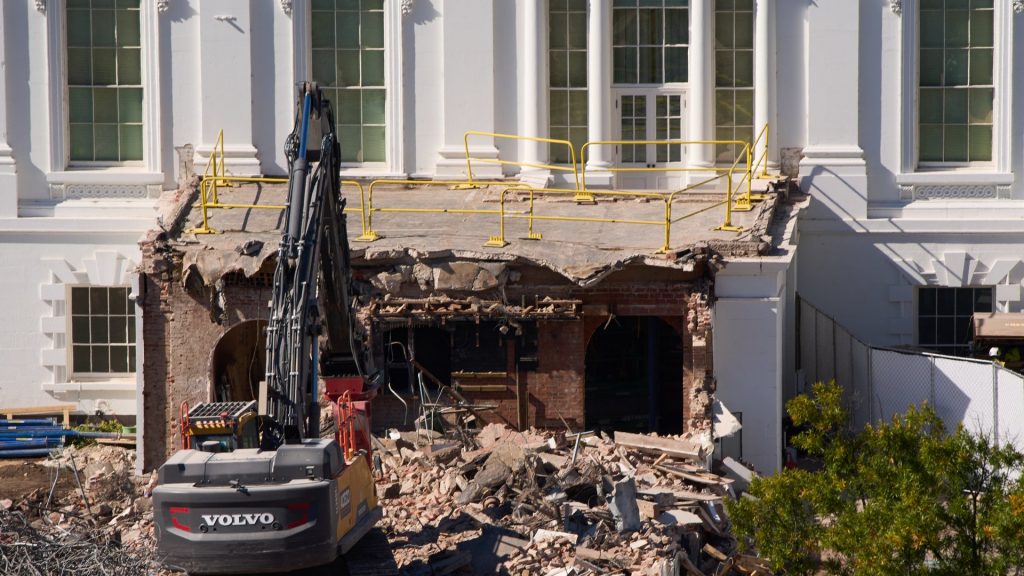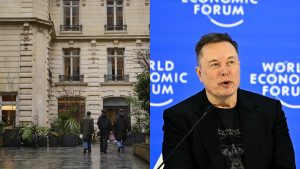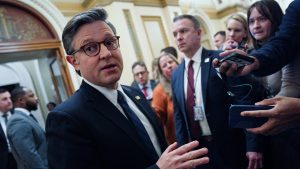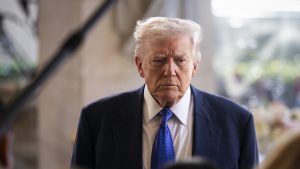Trump says private donors are paying for his ballroom. What’s in it for them?

Broken lumber, concrete and bricks lay where the East Wing of the White House used to be after the structure’s demolition to make room for a new $300 million ballroom. President Donald Trump said taxpayers won’t foot the bill for the project, but a list of private donors paying for the ballroom is raising concerns about what they might expect in return.
Apple, Amazon, Google, an ambassador and a Cabinet official are among the 38 people, organizations and companies that shelled out money to pay for Trump’s ballroom, according to a CNN report. Several ethics lawyers and scholars sounded the alarm that privately funding the project could violate ethics laws and policies.
Bruce Fein, a constitutional lawyer, told Al Jazeera that those donations violated the Anti-Deficiency Act, which prohibits federal employees and agencies from accepting private donations in anticipation of appropriations, unless explicitly approved by Congress, according to the Government Accountability Office. The act has been invoked frequently during the government shutdown to fight against reductions in force.
Unbiased. Straight Facts.TM
The White House revealed that at least 38 people, corporations or organizations are funding a new $300 million ballroom.

Fein said that what is happening at the White House would be akin to Trump building a border wall with donated funds if Congress refused to pay for it.
“Trump is completely transactional,” Fein told Al Jazeera. “Funders of the ballroom will be rewarded with regulatory favors or appointments or given pardons for federal crimes.”
However, Trump allies defended the demolition and construction project.
“The ballroom is going to be glorious,” House Speaker Mike Johnson, R-La., told The Associated Press.
At a White House briefing this week, press secretary Karoline Leavitt stressed that the project will be privately funded and she defended its increasing price tag. Earlier estimates suggested the project would cost $200 million to $250 million.
“With any construction project, there are changes over time as you assess what the project is going to look like — and we’ll continue to keep you apprised of all of those changes,” she said. “But just trust the process. This is going to be a magnificent addition to the White House for many years to come.”
Who’s giving
The first donors became known in September, when CBS News obtained a shortlist of those who pledged to give at least $5 million. The network also reported on plans to etch donors’ names inside the White House and to list them on a website.
Lockheed Martin pledged more than $10 million. The company has been awarded $32.1 billion in contracts with the Defense Department and other agencies over the past year, according to government data.
Jalen Drummond, Lockheed’s vice president of corporate affairs, told CBS that the company was grateful to help Trump’s vision become a reality.

Several major players in the tech industry are helping fund the ballroom. They include Amazon, Apple, Google, HP, Meta Platforms, Microsoft and Palantir Technologies.
Some of those companies have been wrapped up in legal trouble with the federal government. Amazon, for example, agreed to a $2.5 billion settlement with the Federal Trade Commission to end allegations that the company enrolled customers into Prime subscriptions without their consent and made cancellations difficult.
Google’s subsidiary YouTube agreed to pay $22 million toward the ballroom through a settlement agreement with Trump over a lawsuit he filed against the video streaming platform for suspending his account shortly after the Jan. 6, 2021, insurrection at the Capitol.
Among the individuals who have donated to the ballroom are several who have supported Republican candidates or policies across the nation. They include twins Cameron and Tyler Winklevoss, billionaire cryptocurrency investors who have given to Trump’s campaigns, and Small Business Administrator Kelly Loeffler and her husband, Jeff Sprecher, the chairman of the New York Stock Exchange.

Like many others on the list, their business interests often depend on favorable actions by federal regulatory agencies.
A White House official told CBS News that donors were allowed to give a lump sum or spread their contributions over three installments by 2027. The White House did not release the amount pledged by each donor.
Ethical concerns
Richard Painter, a former White House ethics lawyer under the Bush administration, told international news outlet BBC that he saw the ballroom as an “ethics nightmare.”
“It’s using access to the White House to raise money,” he said.
The U.S. Office of Government Ethics, which ensures federal employees comply with their agency’s ethics standards, didn’t immediately respond to Straight Arrow News’ request for comment. The office is closed during the government shutdown. Its mission is to ensure government decisions are “made free from personal financial bias.”
Democrats on the House Natural Resources Committee and Committee on Oversight and Government Reform requested a full report from Trump by Nov. 6 on all communications, site plans, budgets and other relevant documents pertaining to the ballroom.
“The American people deserve full transparency regarding the substantial demolition, preparation and construction at the White House during a government shutdown, particularly when it concerns alterations to one of our nation’s most historically significant buildings,” the lawmakers wrote.
Rep. Mark Takano, D-Calif., introduced bills on Oct. 17 to prohibit the use of federal funds for construction or renovation projects during a shutdown, except in the case of a health or safety risk. He also wants to prohibit displays and engravings of donors on White House grounds without approval from the House speaker, the chamber’s minority leader and the White House curator.
“I will not stand by while we put the name of the highest bidder on one of the most iconic symbols of the United States,” Takano said. “The White House belongs to the people, and the solemn honor of having your name has been reserved for historic public servants — not to billion-dollar donors.”
The post Trump says private donors are paying for his ballroom. What’s in it for them? appeared first on Straight Arrow News.





